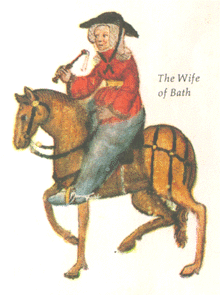|
¡@
The
Wife of Bath's Prologue
And
Tales
 |
THE
WIFE OF BATH'S PROLOGUE
|
- To justify her
five marriages and to suggest that the thing women most
desire is to complete control over their husbands. 1. A
defense of her marriage 2. A confession of her techniques
and a plea for certain reform for women. She uses two basic
arguments: 1. If women remained virgins, there would be no
one left to give birth to more virgins, 2. the sex organs
are to be used for pleasure as well as function. The W of
Bath can quote scripture to prove her points. Her prologue
refutes the popular theory that women should be submissive,
especially in matters of sex. And her argument is against
the authorities of the church and state and that she is a
woman who prefers experience to scholarly arguments.
|
 |
- Dame Alison:
-- amorous, nagging
-- fun, practical, nice to her
husbands--generous
--Her love of life is also
praiseworthy
--Despite the loss of youth and beauty,
she faces her future not only with a woman's ability to endure and
enjoy what she cannot reshape, but also with a zest for life.
-- frank: she tells the truth better
than the pardoner.
-- she uses psychology to manage her
husbands
-- she enjoys her past, accept the
fact; a good nature
¡@
 |
The
Wife of Bath's tale |
¡@
- This tale is an exemplum, a tale told to
prove a point. And the reader should remember that the narrator is
an old hag telling a story about an old hag who gained sovereignty
over her husband.
- In Chaucer's time, the
lit. was filled with the favorite theme of vilifying the frailty of
woman. Chaucer's tale is not a moral diatribe for or against woman. He
creates a woman in the person of the W. of B who both exemplifies
all that has been charged against women but openly glories in the
possession of these qualities. Chaucer does not make it clear
whether he sympathizes with the Wife's opinion of marriage and
celibacy, but it is obvious that he did not agree with the
prevailing notions of his time about celibacy. Usually a
second marriage is considered sinful. A revolutionary
document!
Also there was considerable praise for
perpetual virginity. But if everyone practices virginity, who is to
beget more virgins? The Wife of Bath pleads for the emancipation
of women in the Middle Ages.
- The story matches the
storyteller--consistency
- How does it fit the
Wife of Bath (Why does she tell this kind of tale)?
1. she tells the story to prove that
everything will turn out well if the wife rules, if the wives have
mastery over their husbands.
2. She is attacking the establishment
(the way things were, the church, the knighthood, the unholy friar).
She is making fun of the unholy men, like the friar: "Women may
now go safely where they like: They'll find no other satyr there but
he: And he'll do nothing worse than take their honour."
3. She wants to prove that women are
not amorous as men thought at that time. The wife's revenge:
women at that time were thought evil, amorous.
- The knight's
ordeal/test (in old stories heroes solves riddles): to solve the
riddle-- what women most desire.
His second ordeal: to choose between two--a
beautiful but unfaithful, or a ugly, old but faithful wife.
He passes the test (by placing himself in his
wife's governance and let his wife choose for him) and is rewarded:
he gets a beautiful, young and good wife, and a happy life.
- The knight is
very rude to his old wife at first--a knight should not behave like
this. He should be grateful that this
old woman saves his life. She teaches him a lesson (leads the
knight's initiation) which he should
have learned before he becomes a knight: Poverty is not guilt; one
should respect old age. It's noble
deeds that make the nobleman; it is not wealth or rank makes a
knight a knight.
- Chaucer took his own
idea about the knight, ill-behaved, ill-mannered (unlike other
knight stories) The value of woman's
sovereignty.
- The story is suited to
the Wife's own character psychologically and dramatically, for she,
like the old woman, had wedded a young
man--though unlike the old woman, she couldn't restore her former
youth and beauty!
Study Questions on
Chaucer II
On "Wife of Bath's Prologue and Tale":
11. According to the
anti-feministic theologians in the medieval church, what are the
characteristics of women?
12. What metaphor does Wife of Bath use to
describe the situation when man and woman are put together?
13. Why does Chaucer have such a long detailed
prologue for the Wife of Bath?
14. Give a character sketch of the Wife of Bath.
15. In Wife of Bath's Tale, what is the point of
telling us at the beginning of the story about the supernatural
creatures and their disappearance later?
16. What do you think about Chaucer's arrangement
of the change of the old wife's appearance and the happy ending?
17. What is special about the Wife of Bath's
appearance and personality? Is there a connection between her
personality and the story?
18. How does Chaucer use humor in the tales of the
Miller and the Wife of Bath? Is there any difference in how he uses it
in the two?
¡@
¡@
|